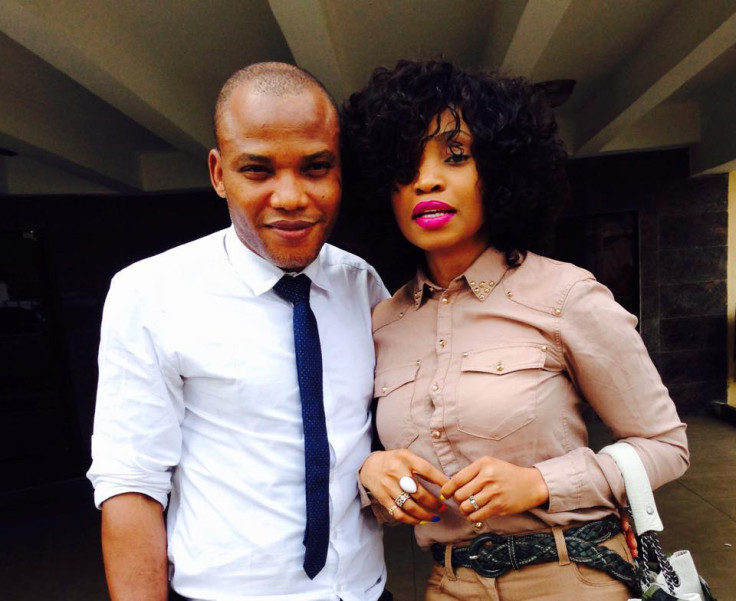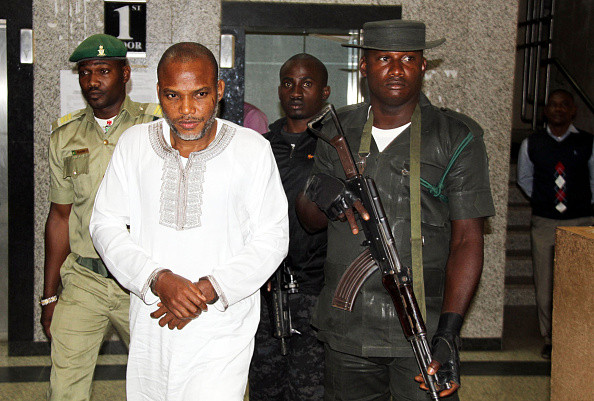Nigeria: Nnamdi Kanu arrest 'catalyst for new Biafran agitation', says Ipob leader's wife

"The absence of my husband is mind-bending, it is inexplicable. I am practically a zombie but I am holding up," Uchechi Okwu-Kanu told IBTimes UK in an exclusive interview. She is the wife of British-Nigerian Nnamdi Kanu, who is standing trial on six counts of treasonable felony charges in Nigeria.
Kanu is one of the leaders of a movement demanding the independence of the Biafran territories forcibly annexed to Nigeria during British colonisation, which ended in 1960. The director of Radio Biafra and head of the Indigenous People of Biafra (Ipob), was arrested in Lagos in October 2015 on conspiracy and terrorism charges, later dropped.
After the Abuja High Court ordered his release, officials pressed new charges against him and President Muhammadu Buhari said Kanu would not be granted bail due to the "atrocities" he had allegedly committed. His comments stirred controversy among human rights groups who urged him to respect court orders.
Okwu-Kanu explained she had lost faith in the Nigerian system, especially the judiciary, which she no longer believes is independent from the "executive and the legislative arms".
"The president once again proved to the world that he encapsulates kakistocracy [Military junta] in his government. He told the world in his media chat that he controls the judiciary arm when he said: 'Nnamdi Kanu will jump bail and thus, will not allow that,'" she said.
"Buhari controls the law so there is no faith," she alleged. "If the masses cannot get justice from whence it should be given because it is controlled by the government, then there shouldn't be a court after all."
Kanu's new defence
Okwu-Kanu said she was happy with her husband's new defence team, headed by Senior Advocate of Nigeria (SAN) Chuks Mouma.
"The new team are working tirelessly to ensure the right justice is given. They have taken the trial to another level – to the Ecowas Court – where and when needed," she said, referring to the fact that Kanu's team filed a lawsuit against Nigeria at the regional West African court demanding $800m (£552m ) in compensation.
"The arrest of Nnamdi Kanu is the catalyst driving the new agitation. Hence, what could have taken years to achieve in terms of awareness and mobilisation was achieved within a short frame of time. And this is testimony to the fact that Ipob through Radio Biafra did a lot of ground work prior to the arrest.
"If you recall I mentioned in December that most people are awaken by the call of this cause but you will agree with me now that almost every being in the whole world has Biafra on their lips both 'for' and 'against',"Okwu-Kanu continued.

Nigerian government position
Pro-Biafrans hold regular marches across south eastern Nigeria calling for independence and the release of Kanu. The activists often claim security forces open fire on "unarmed" and "peaceful" protesters.
It is believed that during one of the latest demonstrations held in Aba State on 9 February, at least 10 people were killed by the army and police, with footage purportedly showing Nigerian security forces attacking pro-Biafrans being widely circulated on social media.
Amnesty International confirmed to IBTimes UK that Nigerian security forces had used excessive force against pro-Biafran protesters on some occasions. However, in subsequent interviews the army and police have denied allegations of violence. Earlier in March, the Chief of Army Staff , Lt. Gen. Tukur Buratai, said the army was investigating the alleged killings in Abia.
The Nigerian government has always maintained that Nigeria's unity was a priority for the country and that although peaceful pro-Biafran protests were welcome, demanding the breakaway of the Biafran territories was against the constitution.
A Biafran Republic was established in 1967 and re-annexed to Nigeria in 1970, following a civil war that claimed between one and three million lives.
Nigeria up close: Check out our Flipboard magazine
© Copyright IBTimes 2025. All rights reserved.






















